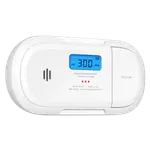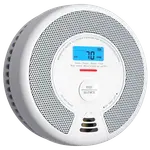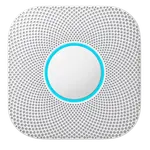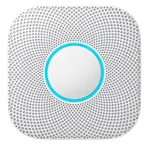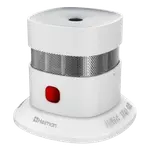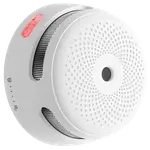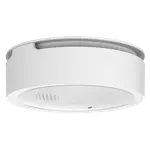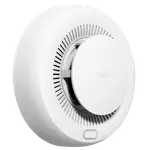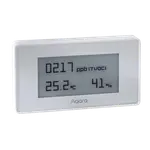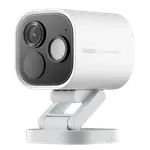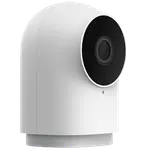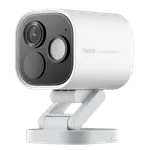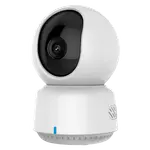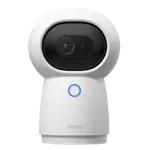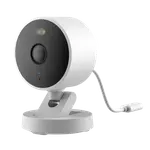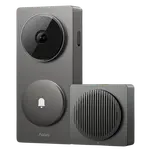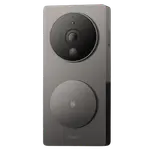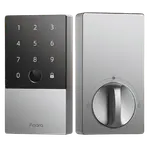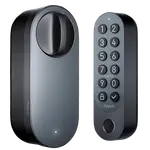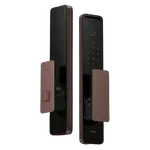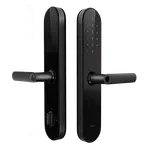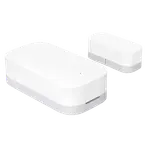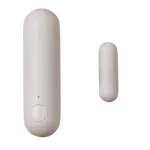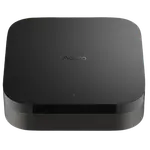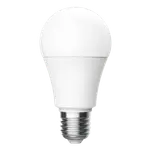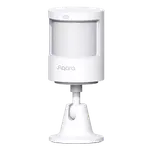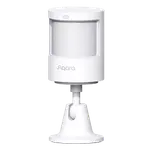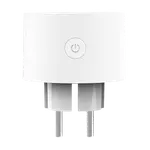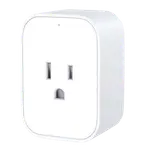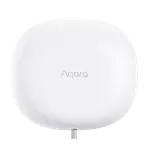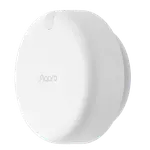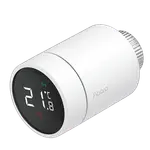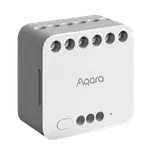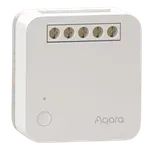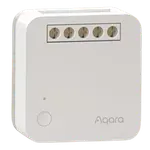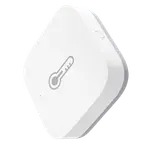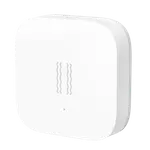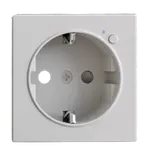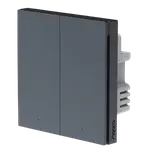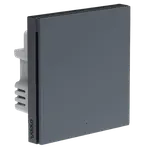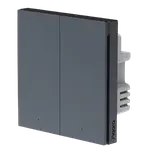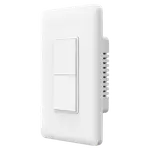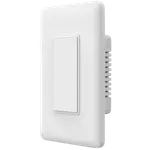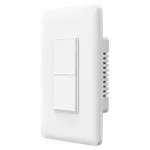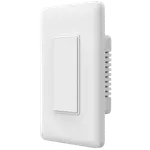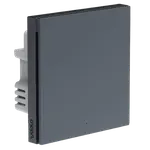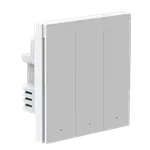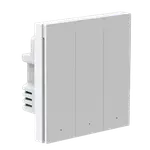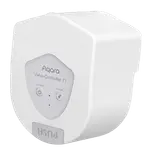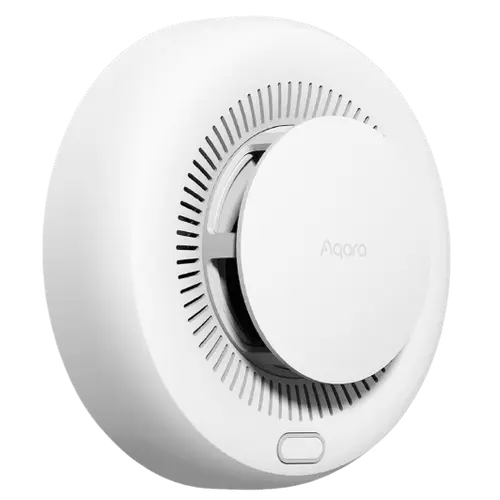
Aqara
Smart Smoke Detector
Launch Year: 2023
Summary
Size & Materials: 104.6 x 42 mm
Connectivity: Zigbee (Zigbee hub required)
Integrations: Apple HomeKit, Home Assistant, IFTTT, Matter
Sensors: Smoke
Alerts: Fire Alerts
Features: Built-in Siren, Built-in Light
Price History
Loading price history...
| Brand | Aqara |
|---|---|
| Headquarters | |
| Website | https://www.aqara.com |
| @AqaraSmarthouse |
Size & Materials
Length x Width x Height
- Length: the longest side of the device
- Width: the shorter side of the device
- Height: the vertical dimension of the device
104.6 x 42 mm
The physical weight of the device, typically measured in grams (g) or ounces (oz).
Weight can be important for installation considerations, especially for wall-mounted or battery-powered devices.
?
Power
Powered by direct electrical connection to your home's power supply.
Wired power ensures continuous operation without battery maintenance or replacement concerns.
NO
The type of batteries required to power the device.
Different battery types offer varying life spans, costs, and availability. Some devices use rechargeable batteries while others use replaceable ones.
CR17450 battery
The expected duration the device can operate on a single battery charge or set of batteries.
Battery life varies depending on usage patterns, connectivity type, and device features.
10 years
Thanks to energy-saving technologies and powerful lithium battery, the device can reach a record ten-year battery life.
Connectivity
Range: The 2.4 GHz band offers a longer range, meaning it can cover larger areas and penetrate solid objects like walls more effectively than 5 GHz.
Speed: Generally, 2.4 GHz provides slower speeds compared to 5 GHz due to a lower maximum data rate.
Interference: More prone to interference since many other devices (like cordless phones, microwaves, and Bluetooth devices) operate on the 2.4 GHz frequency, leading to potential congestion and slower network performance.
NO
Range: Offers a shorter range compared to 2.4 GHz and may have difficulty penetrating walls and other obstacles.
Speed: Typically provides faster speeds and higher data rates due to more available bandwidth.
Interference: Less prone to interference as fewer devices operate on this frequency, leading to a more stable connection.
NO
Bluetooth is a wireless communication technology used for exchanging data over short distances.
Bluetooth enables devices to communicate wirelessly within a short range, typically up to 10 meters (about 33 feet) for most consumer devices.
NO
Zigbee is a wireless communication protocol designed for low-power, short-range applications, commonly used in smart home devices, industrial automation, and other areas requiring reliable, low-data rate communication. It features low power consumption, making it ideal for battery-operated devices, and supports short-range communication, typically up to 100 meters. Zigbee employs mesh networking, allowing devices to relay data through each other to extend range and improve reliability. It supports data rates up to 250 kbps, suitable for small data packets, and ensures interoperability among devices from different manufacturers if they conform to Zigbee standards. Security is robust, with AES-128 encryption for data protection.
Zigbee devices need a Zigbee-compatible hub to connect and communicate with other devices in your smart home setup.
Zigbee hub required
Thread is a wireless communication protocol designed specifically for Internet of Things (IoT) devices, providing secure, reliable, and scalable networking. Unlike some other protocols, Thread is IP-based, which means it can seamlessly integrate with existing internet infrastructure. It operates in the 2.4 GHz frequency band and uses mesh networking to enhance reliability and extend range by allowing devices to relay data through each other.
Thread is optimized for low power consumption, making it suitable for battery-operated devices. It supports low-latency communication, which is crucial for real-time applications like home automation and security systems. The protocol ensures high security with AES-128 encryption and end-to-end security at the network layer. Thread also supports over-the-air updates, ensuring devices can stay up to date with the latest features and security patches.
Thread-enabled devices require a Thread Border Router (such as certain smart home hubs or routers) to connect to your home network and other Thread devices.
NO
Integrations
Google Home serves as a central hub for a variety of smart devices, including lights, thermostats, cameras, and speakers. It leverages Google Assistant for voice control, enabling users to manage their smart home with simple commands.
NO
Amazon Alexa is one of the most widely used smart home systems, known for its compatibility with a vast array of devices. Users can control everything from smart lights to appliances using voice commands through Echo devices.
NO
Apple HomeKit is designed for users in the Apple ecosystem, providing a seamless way to control compatible smart devices through iOS devices using the Home app or Siri. It emphasizes security and user privacy.
YES
SmartThings is a flexible platform that connects a wide range of devices from different brands, offering a unified interface for control. It supports various communication protocols, allowing for extensive device compatibility.
NO
Home Assistant is an open-source platform that allows for extensive customization and integration of a wide variety of smart devices. It supports a multitude of protocols and brands, making it ideal for tech-savvy users.
YES
IFTTT (If This Then That) is a web-based service that allows users to create simple automation sequences, known as applets, which enable different devices, services, and applications to work together seamlessly. It connects a wide range of products and services, facilitating interoperability and enhancing functionality.
YES
Matter is a unified, open-source connectivity protocol designed to standardize and simplify communication between smart home devices from different manufacturers. Developed by the Connectivity Standards Alliance (formerly the Zigbee Alliance), Matter aims to improve interoperability, security, and reliability across various smart home ecosystems.
Matter operates over existing networking technologies, including Ethernet, Wi-Fi, and Thread, providing flexibility in device connectivity. Its IP-based nature allows seamless integration with existing internet infrastructure and cloud services. Matter uses a mesh networking topology, particularly when operating over Thread, to enhance range and reliability by allowing devices to relay data through each other.
Security is a cornerstone of Matter, with end-to-end encryption and secure device onboarding processes ensuring robust protection for data and privacy. Matter also supports over-the-air updates, allowing devices to stay current with the latest features and security enhancements.
YES
Display
Indicates whether the device has a built-in display screen.
A screen can show real-time information, settings, and status without needing to check a mobile app.
NO
The type of display technology used, such as LCD, OLED, E-ink, or LED.
Different screen types offer varying levels of visibility, power consumption, and image quality.
-
Sensors
Detection of smoke particles indicating fire or burning materials.
Smoke detection provides early warning of fires, giving you time to evacuate and call emergency services.
YES
Detection of carbon monoxide gas, which is odorless and potentially deadly.
CO detection protects against carbon monoxide poisoning from faulty furnaces, generators, or vehicles.
NO
Detects whether a room or area is occupied, based on movement or other triggers.
Occupancy sensors are useful for energy-saving automations and security applications.
NO
Measures ambient temperature in the surrounding environment.
Temperature monitoring helps maintain comfortable conditions and can trigger heating/cooling automations.
NO
Measures relative humidity levels in the air.
Humidity monitoring helps prevent mold growth and maintains optimal indoor air quality.
NO
Monitoring of general air quality including particulates and pollutants.
Air quality monitoring helps maintain healthy indoor environments and can trigger ventilation systems.
NO
Measures the amount of light in the surrounding environment.
Ambient light sensors can automatically adjust display brightness or trigger lighting automations based on natural light levels.
NO
Detection of movement within the sensor's detection area.
Motion sensors can detect when people are present, useful for security monitoring and automated responses.
NO
Alerts
Immediate notifications when fire or extreme heat is detected.
Fire alerts provide critical early warning to evacuate and can automatically notify emergency services.
YES
Immediate notifications when dangerous carbon monoxide levels are detected.
CO alerts warn of invisible, odorless gas that can be fatal, allowing time to evacuate and ventilate.
NO
Notifications when the device's battery level becomes critically low.
Battery alerts ensure you can replace or recharge batteries before the device stops functioning.
?
Notifications when temperature readings exceed or fall below preset thresholds.
Temperature alerts can help prevent damage to sensitive items and ensure comfortable living conditions.
NO
Notifications when air quality measurements indicate unhealthy conditions.
Air quality alerts help you take action to improve indoor air, such as increasing ventilation or running air purifiers.
NO
Features
Integrated loud alarm for immediate local warning.
Built-in sirens provide immediate audible warning to all occupants when hazards are detected.
YES
Built-in Siren of up to 85dB
Integrated lighting for visibility during emergencies.
Emergency lighting helps with evacuation in dark conditions and can signal the location of the alarm.
YES
Colorful LED that will blink
Automatic self-testing to ensure proper operation.
Self-testing ensures the alarm remains functional and can alert you if maintenance is needed.
NO
Gentle lighting to guide safe movement in dark conditions.
Pathlight provides low-level illumination for safe navigation without disturbing sleep.
NO
Intelligence to distinguish between dangerous smoke and harmless steam.
Steam check reduces false alarms from showers and cooking while maintaining fire protection.
NO
The ability to create automated actions based on sensor readings or schedules.
Automations can trigger other smart devices, send notifications, or adjust settings without manual intervention.
YES
Compare Smart Smoke & CO alarms by power source, connectivity, sensors, alerts, display, integrations, automations, and safety features.
![Aqara TVOC Air Quality Monitor]() Aqara
AqaraTVOC Air Quality Monitor
![Aqara CameraHub G5 Pro PoE]() Aqara
AqaraCamera Hub G5 Pro PoE
![Aqara Camera Hub G2H Pro]() Aqara
AqaraCamera Hub G2H Pro
![Aqara Camera Hub G5 Pro Wifi]() Aqara
AqaraCamera Hub G5 Pro Wifi
![Aqara Camera E1]() Aqara
AqaraCamera E1
![Aqara Camera Hub G3]() Aqara
AqaraCamera Hub G3
![Aqara Camera G100]() Aqara
AqaraCamera G100
![Aqara Doorbell Camera Hub G410]() Aqara
AqaraDoorbell Camera Hub G410
![Aqara Smart Video Doorbell G4]() Aqara
AqaraSmart Video Doorbell G4
![Aqara Smart Lock U100]() Aqara
AqaraSmart Lock U100
![Aqara Smart Lock U200]() Aqara
AqaraSmart Lock U200
![Aqara Smart Lock D200i]() Aqara
AqaraSmart Lock D200i
![Aqara Smart Lock N100 Zigbee Edition]() Aqara
AqaraSmart Lock N100 Zigbee Edition
![Aqara Door and Window Sensor]() Aqara
AqaraDoor and Window Sensor
![Aqara Door and Window Sensor P2]() Aqara
AqaraDoor and Window Sensor P2
![Aqara Hub M3]() Aqara
AqaraHub M3
![Aqara Hub M3]() Aqara
AqaraHub M3
![Aqara LED Bulb T1]() Aqara
AqaraLED Bulb T1
![Aqara Motion Sensor P1]() Aqara
AqaraMotion Sensor P1
![Aqara Motion and Light Sensor P2]() Aqara
AqaraMotion and Light Sensor P2
![Aqara Smart Plug (EU)]() Aqara
AqaraSmart Plug (EU)
![Aqara Smart Plug (US)]() Aqara
AqaraSmart Plug (US)
![Aqara Presence Sensor FP1E]() Aqara
AqaraPresence Sensor FP1E
![Aqara Presence Sensor FP2]() Aqara
AqaraPresence Sensor FP2
![Aqara Radiator Thermostat E1]() Aqara
AqaraRadiator Thermostat E1
![Aqara Dual Relay Module T2]() Aqara
AqaraDual Relay Module T2
![Aqara Single Switch Module T1 (No Neutral)]() Aqara
AqaraSingle Switch Module T1 (No Neutral)
![Aqara Single Switch Module T1 (With Neutral)]() Aqara
AqaraSingle Switch Module T1 (With Neutral)
![Aqara Smart Smoke Detector]() Aqara
AqaraSmart Smoke Detector
![Aqara Temperature and Humidity Sensor]() Aqara
AqaraTemperature and Humidity Sensor
![Aqara Vibration Sensor]() Aqara
AqaraVibration Sensor
![Aqara Wall Outlet H2 EU]() Aqara
AqaraWall Outlet H2 EU
![Aqara Smart Wall Switch H1 EU (No Neutral) - Double]() Aqara
AqaraSmart Wall Switch H1 EU (No Neutral) - Double
![Aqara Smart Wall Switch H1 EU (With Neutral) - Single]() Aqara
AqaraSmart Wall Switch H1 EU (With Neutral) - Single
![Aqara Smart Wall Switch H1 EU (With Neutral) - Double]() Aqara
AqaraSmart Wall Switch H1 EU (With Neutral) - Double
![Aqara Smart Wall Switch (No Neutral) - Double]() Aqara
AqaraSmart Wall Switch (No Neutral) - Double
![Aqara Smart Wall Switch (No Neutral) - Single]() Aqara
AqaraSmart Wall Switch (No Neutral) - Single
![Aqara Smart Wall Switch (With Neutral) - Double]() Aqara
AqaraSmart Wall Switch (With Neutral) - Double
![Aqara Smart Wall Switch (With Neutral) - Single]() Aqara
AqaraSmart Wall Switch (With Neutral) - Single
![Aqara Smart Wall Switch H1 EU (No Neutral) - Single]() Aqara
AqaraSmart Wall Switch H1 EU (No Neutral) - Single
![Aqara Smart Wall Switch H1 EU (No Neutral) - Triple]() Aqara
AqaraSmart Wall Switch H1 EU (No Neutral) - Triple
![Aqara Smart Wall Switch H1 EU (With Neutral) - Triple]() Aqara
AqaraSmart Wall Switch H1 EU (With Neutral) - Triple
![Aqara Water Leak Sensor]() Aqara
AqaraWater Leak Sensor
![Aqara Water Leak Sensor T1]() Aqara
AqaraWater Leak Sensor T1
![Aqara Valve Controller T1]() Aqara
AqaraValve Controller T1



